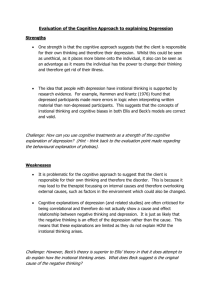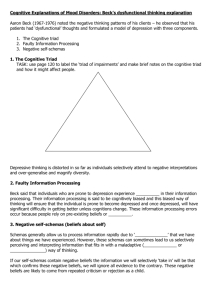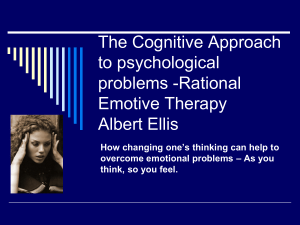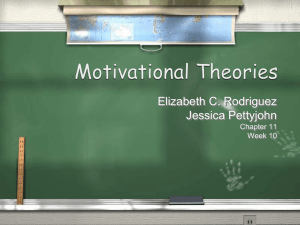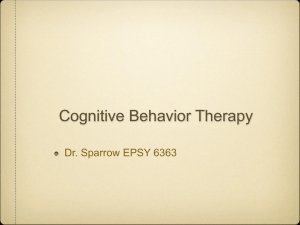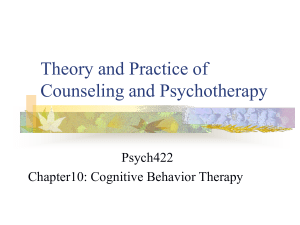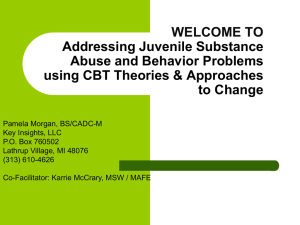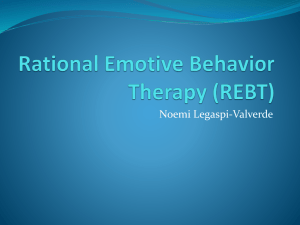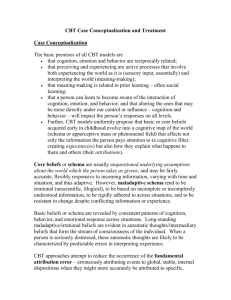CBT_PP FINAL
advertisement
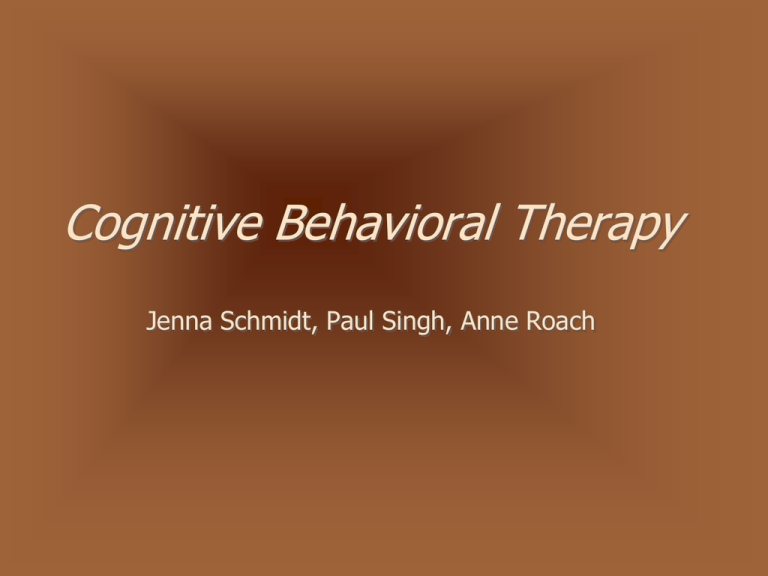
Cognitive Behavioral Therapy Jenna Schmidt, Paul Singh, Anne Roach History • Psychological distress stems from faulty or damaging mental processing from an experience • Deal with cognitions, interpretations, beliefs and responses, with the aim of influencing problematic emotions and behaviors. • Reorganization of one’s self-statements will result in a corresponding reorganization of one’s behavior. Albert Ellis Rational Emotive Therapy (REBT) Goal of Happiness ABC Model Eleven irrational beliefs You FEEL the way you THINK It is not the events taking place in our lives that upset us It is the beliefs that we hold that cause us to become depressed, anxious, enraged, etc. The Goal of Happiness We want to be happy whether we are alone or with others We want to be well informed and educated We want a good job with good pay We want to enjoy our leisure time ABC MODEL A. Something happens B. You have a belief about the situation C. You have an emotional reaction to the belief Ellis’s Model ABC Model of Emotional Disturbance A B C Belief Emotional Consequence A B C Difficulty Understanding Math Text I’ll never get this! Feeling Miserable Activating Event For Example: D- Disputing Intervention The therapists disputes the client’s irrational beliefs - “Why must you win everyone’s approval?” - “Where is it written that other people must treat you fairly?” - “Just because you want something, why must you have it?” E- Effective New Philosophy The client learns new ways to substitute more adaptive thoughts in place of the beliefs that often involve unrealistic and over-generalized attributions - “I don’t’ need everyone’s approval” - “Others don’t need to treat me fairly” F- Feelings (new) The client’s new trains of thought lead to more effective and rational behavior - “I can approval by my boss by going above and beyond what is expected of me” - “I really want that new Channel purse, after I save my money, I will buy it” ABC MODEL Video: http://www.youtube.com/watch?v=DxUKR1f_WA 11 Irrational Beliefs 1. Essential for a person to be loved or approved 2. A person must be perfectly complete 3. Some people are bad, and should be punished. 4. It is terrible when things are not as a person wants them to be. 5. Unhappiness caused by outside circumstances; person has no control over it. 6. Dangerous, fearsome things cause for great concern; possibilities must be dwelt on. Irrational Beliefs cont. 7. It is easier to avoid certain difficulties than to face them. 8. A person should be dependent on others. 9. Past experience and events are the determinants of present behaviors 10. A person should be upset over other people’s problems and disturbances. 11. There is always a right perfect solution to every problem, and it must be found. Activity Aaron Beck • Cognitive Therapy • Recognizing & changing negative, maladaptive thoughts • Reorganization of self-statements will result in a corresponding reorganizing of behavior. Beck’s Model of Emotional Disturbances I’m Incompetent Difficulty Understanding Math Text I’ll never get this! ( Activating Event ) ( Automatic Thought ) ( Core Belief ) Feeling Miserable ( Emotional Consequence ) (Livingston, 2008) Beck’s Cognitive Triad • Depressed people are plagued by a cognitive triad of beliefs: 1.The client sees self as “defective, inadequate, diseased, and deprived” 2.Client interprets experience as negative 3.Client sees the future as continuing in a grim fashion and expect failure http://slabbed.files.wordpress.com/2008/08/depression-becks-theory3.jpg Beck’s Model of Emotional Disturbance Activating Event Automatic Thought Emotional Consequence (Livingston, 2008) Example of: Mood Log Automatic Thoughts: Distortions Rational Response My mind will just wander like yesterday. I can’t remember anything I read. I can’t possibly read 200 pages this week… (Livingston, 2008) Goals of Cognitive Therapy: Change the way a client thinks by using automatic thoughts and schema restructuring Cognitive Schemas contain peoples perceptions of themselves and others, their goals and expectations, memories, fantasies, and previous learning. Therapy Brief & Structured Problem Solving Goals: • Change irrational beliefs into rational beliefs • for the client to develop a new way of thinking and substitute it for an old way that has not worked well • Client can become own therapist for future Therapeutic Relationship Collaborative Persuasive Teacher Model Behavior Techniques Ellis’s ABC Model Beck’s Cognitive Triad Collaborative Empiricism Socratic Dialogue Training - Albert Ellis Institute, New York, NY - Beck Institute for Cognitive Therapy & Research, Bala Cynwyd, PA Certifications Offered by the National Association of Cognitive-Behavioral Therapists Diploma in Cognitive-Behavioral Therapy Certified Cognitive-Behavioral Therapist Benefits Brief form of therapy REBT effective for helping people in crisis Affective for individuals, groups, coupled, or families Discourages dependence on the therapist Has emphasis on outside work Risks/Limitations/Criticisms Prescriptive Model Cultural Concerns Unfinished Business Brainwashing Most Common Theories (400 Theories) (Livingston, 2008) References • Corey, G. (2004). Theory and practice of counseling and psychotherapy: student manual (7th ed). Pacific Grove, CA: Brooks Cole Company. • Cormier, S., Nurius, P., Osborn, C. (2003). Interviewing and change strategies for helpers (6th ed). Belmont, CA: Brooks Cole Company • Corsini, R.J., & Wedding, D. (2000). Current psychotherapies (6th ed). Itasca, IL: F.E. Peacock Publisher, Inc. • Day, S.X. (2008). Theory and design in counseling and psychotherapy (2nd ed.). Boston: Lahaska Press. • Livingston, T. M. (2008). Behavioral therapies & cognitive behavioral therapies. Counseling Theories. St. Cloud: St. Cloud State University.
